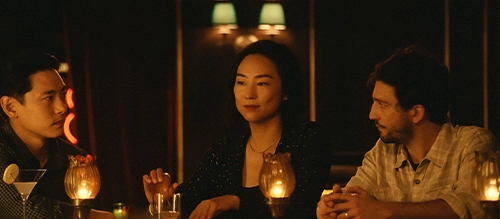Past Lives (2023) Review

Past Lives (2023)
Director: Celine Song
Screenwriter: Celine Song
Starring: Greta Lee, Teo Yoo, John Magaro
Two near-identical frames. One of a woman on the edge of the right hand side, sitting at a desk looking down into the lens of her laptop webcam. Another of a man on the edge of the left hand side, sitting at a desk looking down into the lens of his laptop webcam. The film intercuts between them. The framing and the edit creates a closeness between the two subjects, indicating a deep intimacy, while the laptops at the edges of each frame capture love and relationships in the 21st century. Technological devices may connect us all, yet we remain separated by time and space. This scene, with these two intricately designed frames, encapsulate what Past Lives is all about: there is a powerful bond between these two people yet there is always something between them. Will they be able to overcome this obstacle or are they forever destined to be separate?
Past Lives is spread across three decades, and presents the ways in which Hae Sung (Teo Yoo) and Nora (Greta Lee) have come and gone from one another’s lives (almost like Richard Linklater’s Before Trilogy condensed into one movie). Nora tells her partner, and consequently each of us, of the Korean word “in-yeon“, meaning “providence” or “fate”, the idea that if two strangers walk by each other in the street and their clothes accidentally brush, there have been eight-thousand layers of in-yeon between them. A strong connection clearly exists between Hae Sung and Nora, one that could only be described as in-yeon.
Celine Song captures not only the connections of the twenty-first century but also the profound love between any two people. Most of this is done through the gorgeous cinematography of Shabier Kirchner as well as the blocking of actors within scenes, while the location choices and set design are also noteworthy in this regard. There are numerous moments throughout the film – such as the aforementioned facetime scene – in which Song reminds us of the barriers between the two leads as well as the love that damn near transcends it; the two find themselves holding onto a pole on a train, their hands are mere centimetres away from one another yet the pole stands between them. When we see Hae Sung visiting Nora and her current partner Arthur (John Magaro), Song further uses her blocking of the characters to control the dynamic of the three in such a way that it leaves it up to our own perspectives to decide the dynamic we see from frame to frame. For example, the film opens with a shot of the three of them at a bar, a lone lantern sitting between each character, leaving us to question whether the distance between Nora and Arthur is greater than the distance between Nora and Hae Sung or whether the lantern between Nora and Arthur burns brighter than the one between Nora and Hae Sung.

This dynamic is made even more powerful by all three performers, though it is the performance of Grace Lee that the film hinges upon. Where it is always clear that Hae Sung wants to be with Nora and Arthur fears that she may leave him for the other man, it is in Nora’s conflicted feelings that the drama of the film truly shines. The way she looks at either man with longing or with uncertainty, through her eyes or a smile, forces us to question more than what is said, to read more into the story than is present in its straightforward dialogue.
With this in mind, the beauty of Celine Song’s screenplay cannot be overlooked. Song has penned a love story for the ages that could only be rivalled in its sophistication and grace by the works of Shakespeare, Austen or Brontë. By structuring the work in three parts, three separate decades, Song cements the idea of in-yeon into our minds. Not only is it the only explanation for the connection between Nora and Hae Sung, but in seeing these individual decades we are (in a way) seeing their “past lives” together. In doing so, one can’t help but to feel that the two are destined to be together, leaving us to spend the next hour and forty-five minutes begging for it to happen, emotionally swelling up as the film goes on, waiting for a release that may never come.
Ultimately, Past Lives is a beautiful film that is worthy of great renown. Celine Song offers one of the greatest debut features of all time. In crafting Past Lives, Song has constructed an achingly beautiful film that is certain to strike a chord with many, leaving memories and feelings in each of us for what is sure to be a very long time.
Score: 24/24
Recommended for you: More Coverage from EIFF

